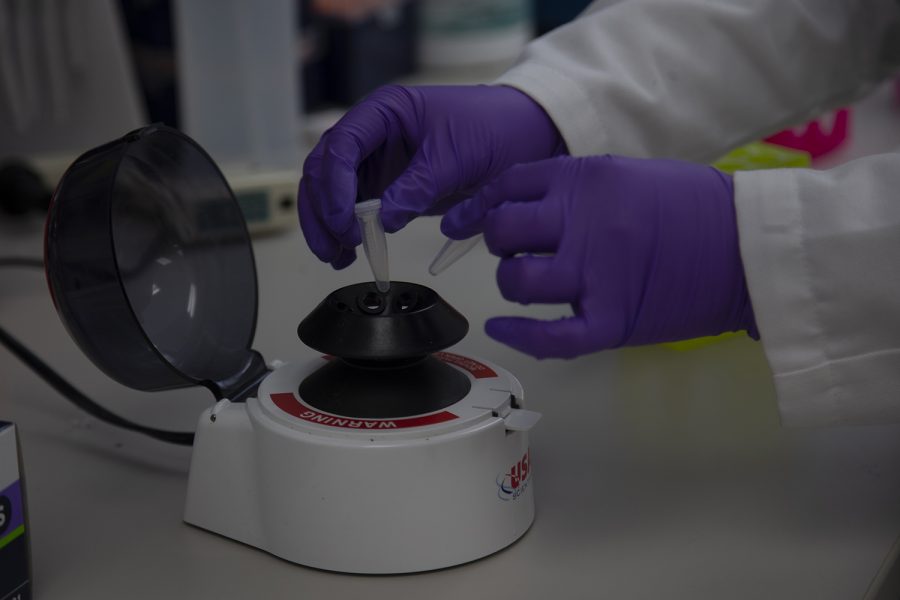Research at University of Iowa put on pause due to COVID-19
Research at the University of Iowa has gone online or been put on pause, according to the office of the vice president for research.
Test tubes with samples are put into a spinner at the University of Iowa Medical Laboratory on Wednesday, Sept. 25, 2019.
April 28, 2020
With COVID-19 restrictions impacting universities around the nation, research at the University of Iowa has been put on hold.
Stephen Pradarelli, strategic communications director for the office of the vice president for research, said in an email to *The Daily Iowan* that researchers are doing everything they can to prevent the spread of COVID-19, and for that reason, most research has been put on pause.
“Except for research into the virus, and other work involving subjects who must continue receiving life-saving treatments as part of a study, all on-campus research activities have largely gone into a kind of ‘hibernation’ mode,” he said in the email. “However, many of our researchers and scholars are continuing their work from home, conducting data analyses, gathering data from subjects remotely, and writing papers.”
Pradarelli said that the UI Office of the Vice President for Research is working with colleges, investigators, and federal funding agencies to find a solution for research that can’t continue remotely. In the meantime, many researchers are focused on online instruction, or are helping with the UI’s efforts to mitigate the spread of COVID-19.
“In some cases, faculty and staff have offered to support the university response to COVID-19 in other ways, based on their qualifications and specific needs, which are quite variable,” Pradarelli said.
The office published a news release March 23, asking for help in collecting supplies and potential lab volunteers for UI Health Care’s COVID-19 testing.
Holden Thorp, the editor-in-chief of Science Family Journals for the American Association for the Advancement of Science, said national research suspended or delayed at varying levels around the U.S. can have a major impact.
“There’s significant repercussions of this because a lot of important research that was helping us with big problems that will still be there when this is all over, like climate change, inequality, cancer, metabolic disease, is not moving forward at the rate that it should,” he said. “When we get to the other side of this, we are going to be further behind on those things than we would have been.”
Thorp also mentioned the human impact on individuals who aren’t making progress toward their degrees or areas of study, or those who have to graduate into a difficult or impossible job market.
“I’m hopeful that most universities are allowing graduate students to stay enrolled, so they can wait and graduate, if they don’t have a job now, at a more favorable time,” he said. “Graduating right now is very tough for graduate students … as far as research is concerned, graduate students who would be defending their thesis now and graduating, if they don’t have a job lined up, it’s probably better for them to stay in graduate school if possible.”
Thorp said research has the potential to bounce back quicker than other fields as COVID-19 restrictions loosen, due to the amount of control can be kept in a lab setting.
UI graduating senior and biomedical-science major Julia Miller was working in a lab studying neural networks in migraines at the UI this semester, when COVID-19 restrictions changed how her lab operated.
“They completely banned any undergraduates from going into the lab, so any work that was done by undergrads wasn’t allowed anymore,” she said. “Instead, what we’ve been doing has been a lot of literature reviews, which has actually been a really good experience to learn the background of what we’re doing in a lot greater depth.”
In addition to more research-based work, Miller’s lab meets via Zoom weekly to discuss articles and touch base with those who still have access to the lab.
Miller said she’s staying positive with this opportunity to improve her skills in the reading and writing side of research.
“It is kind of a bummer,” she said. “I really enjoy doing the lab work and being in the lab, so it is kind of sad that I don’t get to spend my last few weeks of school doing the work that I’ve done for a while now, but it’s cool that I get to expand in other areas of my knowledge.”



